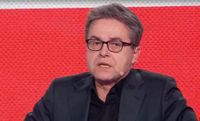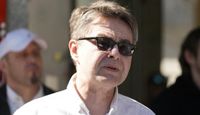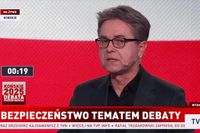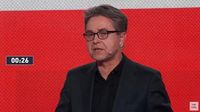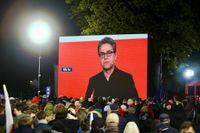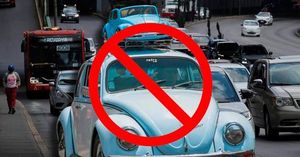On Friday, April 11, 2025, two presidential debates took place in Końskie, Poland, showcasing a diverse array of candidates and sparking significant public interest. The first debate, broadcast by TV Republika, was held in the local market, while the second, organized by the staff of presidential candidate Rafał Trzaskowski, occurred in a sports hall and began with a notable 40-minute delay, as candidates arrived at the venue.
The first debate featured prominent political figures, including Karol Nawrocki, Szymon Hołownia, Krzysztof Stanowski, Marek Jakubiak, and Joanna Senyszyn, who notably arrived late. The second debate saw the addition of Trzaskowski, along with Magdalena Biejat and a more controversial figure, Maciej Maciak.
Maciej Maciak, born in Włocławek, is a journalist, social activist, and politician, running for president as the leader of the Ruch Dobrobytu i Pokoju (RDiP). His presence in the debates raised eyebrows, given his past and controversial statements. Maciak has a history of involvement in local media and politics, having previously run for the Kujawsko-Pomorskie voivodeship sejmik in 2006, and he attempted to secure the presidency of Włocławek in both 2018 and 2024, receiving 14.13% and 7.42% of the votes, respectively. In 2023, he ran for the Sejm, garnering 1,298 votes in district No. 5.
His candidacy has not been without controversy. Maciak has faced accusations of pro-Russian sympathies, which he has consistently denied. In 2019, he was convicted for publicly insulting a black doctor, Emanuel Kalejayie, who was his opponent in the Włocławek presidential election.
During the second debate, Krzysztof Stanowski posed a pointed question to Maciak, asking, "Who are you?" In response, Maciak humorously declared, "A small Pole," referencing a well-known line from a poem by Władysław Bełza. This exchange highlighted the tension and competitive nature of the debates, where candidates sought to assert their identities and platforms.
Maciak's campaign focuses on several key issues, including increasing social benefits, improving living conditions for pensioners in Poland, limiting foreign capital influence, developing renewable energy sources, and pursuing a pro-peace foreign policy. He emphasized these points during the debate, aiming to resonate with voters concerned about social welfare and economic stability.
In an earlier part of the debate, Maciak addressed a question regarding universal conscription, stating, "I do not want to support any form of militarization, as it is the cause of all wars. If someone is weak in diplomacy, armaments won’t help." His remarks reflect a broader sentiment among some voters who prioritize diplomatic solutions over military ones.
Throughout the debates, the atmosphere was charged, with candidates often interrupting each other and the audience reacting vocally. This dynamic underscored the high stakes of the upcoming presidential election, as candidates vie for public support amid a backdrop of political polarization in Poland.
As the debates progressed, the candidates' differing views on critical issues became more pronounced. For instance, while Maciak advocated for a reduction in military spending, others emphasized the need for a strong defense policy, reflecting the ongoing debate about national security in the region.
Maciek's past has also been a topic of discussion, with his history of controversial statements regarding foreign regimes drawing scrutiny. He has referred to Vladimir Putin and Russia as "a bastion of normality," which has raised alarms among critics who view such remarks as dangerously naive or even supportive of authoritarian regimes.
Despite these controversies, Maciak's ability to connect with voters, particularly through his media presence, cannot be overlooked. He previously served as the director of local television CW 24tv for a decade and later launched a YouTube channel, Musisz to wiedzieć, which has over 66,500 subscribers. This platform has allowed him to share his views on politics and social issues, further amplifying his voice in the crowded political landscape.
As the election approaches, it remains to be seen how Maciak's controversial past and his proposals will resonate with the electorate. The debates have provided a critical platform for candidates to outline their visions and challenge one another, setting the stage for a competitive race.
The public's response to the debates has been mixed, with some praising the engagement of candidates and the issues being raised, while others express concern over the tone and direction of the discourse. The outcome of this election could significantly impact Poland's political landscape and its approach to both domestic and international challenges.
In summary, the presidential debates in Końskie have not only highlighted the candidates' differing platforms but also showcased the complexities of public sentiment in Poland today. With figures like Maciej Maciak entering the fray, voters are faced with choices that reflect a range of perspectives on governance, social policy, and international relations. As the election date draws near, the debates will likely continue to shape the narrative surrounding the candidates and their campaigns.
